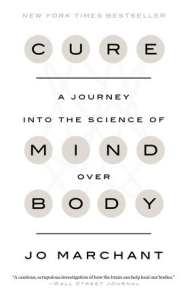Jo Marchant's Cure: A journey into the science of mind over body
11 April 2017
 Prof. David Sowden's spring book review - Jo Marchant - Cure: A journey into the science of mind over body
Prof. David Sowden's spring book review - Jo Marchant - Cure: A journey into the science of mind over body
 The language may at times edge towards the journalistic but Dr Marchant (she has a PhD in genetics and medical microbiology) continues to drag the topic back to a scientific and rational perspective, rather than the all too common approach of many complementary therapists: mere wishful thinking or worse still cynical salesmanship.
As doctors we have to acknowledge that modern medicine does not have all the answers. After all, there are many patients whose lives are blighted by a symptom or complex of symptoms for which our rational, scientific approach has no solution. All too often these patients are conveniently pigeon holed or dismissed as not having a real condition. However, it is surely irrational and dangerously dismissive just to ignore the reality of the experience of those symptoms. Might it even be unethical?
Primary care is full, or at least appointment slots are full, of patients that hospital medicine has passed back with persisting symptoms but for whom the main diagnosis is that their illness is functional. Let’s be honest, that means they are being identified as having no “real” condition – indeed the sub-text is that they are somehow psychiatrically or psychologically deficient, even making up or at the very least exaggerating their symptoms.
The language may at times edge towards the journalistic but Dr Marchant (she has a PhD in genetics and medical microbiology) continues to drag the topic back to a scientific and rational perspective, rather than the all too common approach of many complementary therapists: mere wishful thinking or worse still cynical salesmanship.
As doctors we have to acknowledge that modern medicine does not have all the answers. After all, there are many patients whose lives are blighted by a symptom or complex of symptoms for which our rational, scientific approach has no solution. All too often these patients are conveniently pigeon holed or dismissed as not having a real condition. However, it is surely irrational and dangerously dismissive just to ignore the reality of the experience of those symptoms. Might it even be unethical?
Primary care is full, or at least appointment slots are full, of patients that hospital medicine has passed back with persisting symptoms but for whom the main diagnosis is that their illness is functional. Let’s be honest, that means they are being identified as having no “real” condition – indeed the sub-text is that they are somehow psychiatrically or psychologically deficient, even making up or at the very least exaggerating their symptoms.
 The book seeks, in part, to challenge the hegemony of the physical sciences and brings to the fore the traditional but seemingly increasingly side-lined view that Medicine is both art and science. Marchant powerfully puts the argument for doctors,
The book seeks, in part, to challenge the hegemony of the physical sciences and brings to the fore the traditional but seemingly increasingly side-lined view that Medicine is both art and science. Marchant powerfully puts the argument for doctors,
harnessing [their] patient’s psychological resources as a critical component of their care”.With reference to objective research on aspects of alternative therapies and interventions she argues, persuasively in the light of some of the research, that “it costs less [overall]” and that “patients suffer fewer complications, recover faster, and [in many cases] live longer” if their mental and emotional state is incorporated into their package of care. She argues that when we’re ill and when we’re receiving medical care our mental state matters. “We are human, not machines after all”. The mind and the body inevitably interact. Of all the reports of current treatments, the one that gave me most pause for thought was that of Whorwell (Wythenshawe Hospital) and his management of patients with Irritable Bowel Syndrome (IBS). His work has demonstrated that hypnotism is remarkably effective in treating IBS; especially those with recalcitrant symptoms. Whorwell writes:
Medicine has become terribly technical. We’re wedded to drugs, scans, all this high-tech stuff. Something as simple and mundane as hypnosis can’t be seen as being any good [in such a world].”He doesn’t quite say it but perhaps there is something almost approaching religious dogma that places the double-blind controlled trial as the only acceptable, reliable measure of a treatment or intervention. Whorwell has published widely and his work has been subject to stringent peer review, and yet remarkably his treatment is not being offered to the vast majority of patients with intransigent IBS symptoms across the NHS. Why? It certainly can’t be cost as his treatment option is at the very worst no more expensive than others, and it works; his treatment outcomes cannot be matched by any current pharmacological intervention. Equally thought provoking were the studies into the placebo effect where patients still had a positive treatment outcome even though they knew they were taking a placebo. Prescribing placebos has always been dogged by the fear that in some way the patient was being conned and hence the actions of the prescriber were at best ethically suspect; but if the placebo effect remains despite the patient’s awareness of the same then, surely, any moral or ethical objection to the use of placebos disappears. For doctors though, perhaps the biggest challenge in prescribing placebos is overcoming prejudice. Perhaps best exemplified by a quote from The Lancet (1954) –“Placebos comfort the ego of unintelligent or inadequate patients”. Marchant makes the important statement:
placebos cannot do anything that the body itself is incapable of doing but perhaps we underestimate what are bodies [and minds] are capable of under the right circumstances”.Also, I don’t or rather can’t accept Edzard Ernst’s (Chair of Alternative Medicine, Exeter University) statement that – “we should always maximise the placebo effect in conjunction with effective treatments” (my emboldening). This is a difficult argument to make in the case of say Prozac in a mildly depressed but non-suicidal patient. Prozac is marginally better than placebo but its side effect profile, considerably worse. In a world where patients should be offered choices then one of those choices might legitimately be a placebo – such agents have none of the associated risk of side effects present with pharmacologically active substances. If a condition is not life-threatening, why not give placebos a chance? Of course, we live in a medical world dominated by big business and, in particular, Big Pharma. As doctors, most of us know that this business focus is creating “new diseases” and medicalising an increasing numbers of people, who then become patients and most of us feel somewhat uneasy about the current direction of travel. Will a point be reached when everyone on the planet is taking a pharmacologically active substance? If so, is that desirable or morally acceptable? What is troubling is that the vast majority of research monies and research effort goes into expanding the criterion for whole sections of the population to take drugs. Often with little likelihood of personal benefit but rather because treatments of populations reduce overall risks of morbidity and mortality. Marchant’s personal comments about her experience of obstetric care are pertinent and something that should make all doctors’ reflect.
I received state of the art medical care but I felt like an object on a conveyor belt, a passive recipient of a bewildering series of medical interventions…….but ultimately I found… [the] loss of control more distressing.”She poses a question that we as a profession should have an answer to – “[Why can’t we have] a [genuine] partnership between equal human beings?” I know this is difficult in the increasingly stressed environment of the NHS but shouldn’t our professionalism insist on such a humane and sensible approach? I could go on but what I would rather you did is just read this book, and think carefully about how its messages might alter your practice. From such small actions can come major changes. Cure: A journey into the science of mind over body Jo Marchant Canongate. ISBN 978 0 85786 883 1 Prof. David Sowden MBChB, FRCGP, FRCOG, FFSEM, FAoME, DCH. Now retired. Formerly : Dean of Post-Graduate Medical Education East Midlands (2000 – 2012) Director of Medical Education England (2008/09 and 2012)
